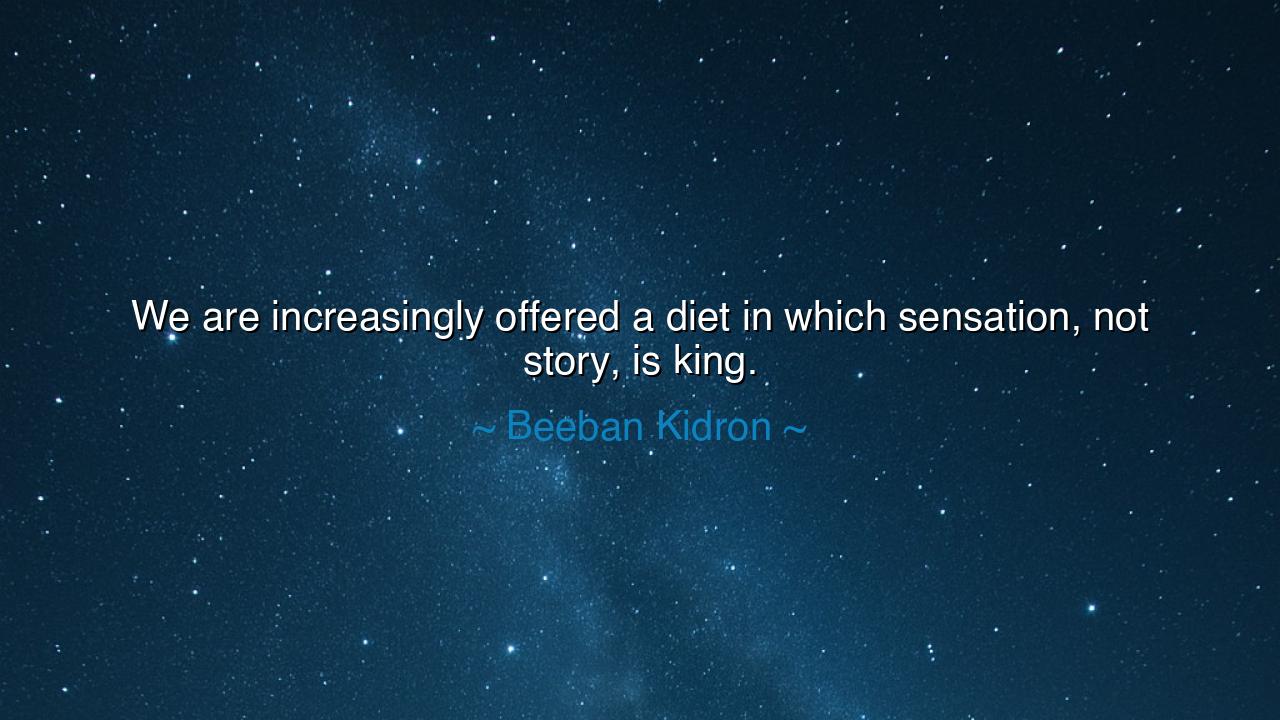
We are increasingly offered a diet in which sensation, not story






In the modern age, we stand at a crossroads, where the values that once governed our lives—values of meaning, depth, and narrative—are being displaced by the allure of fleeting sensations. Beeban Kidron aptly captures this transformation when she says, "We are increasingly offered a diet in which sensation, not story, is king." These words speak to a profound shift in the way we consume culture, a shift that has seen the importance of storytelling, the soul of human experience, being eclipsed by the desire for immediate gratification and the quick pleasure of sensation. The story of the world, once shared through deep narratives passed down through generations, now struggles to compete with the ever-present craving for sensory stimulation.
Consider, children, the wisdom of the ancient Greeks, who revered the story as the highest form of cultural expression. The works of Homer, particularly the Iliad and the Odyssey, were not just tales of adventure; they were mirrors reflecting the human condition—the triumphs and failures, the joys and sorrows, the complexities of honor, fate, and love. These stories were not merely entertainment—they were the very fabric of society. They taught lessons, shaped values, and offered a window into the world of the gods and men alike. Kidron's words remind us that, in this modern age, we have lost something precious in our relentless pursuit of sensory experiences—the depth of story, which once shaped our understanding of the world and our place within it.
In the Roman Empire, Virgil's Aeneid stood as a testament to the power of story. This epic was not just the tale of Aeneas's journey; it was a profound meditation on the nature of duty, destiny, and the cost of empire. Like the works of Homer, Virgil's stories were meant to build the soul, to instruct in the ways of leadership and morality, and to root the people in a shared history. But in today’s world, where the next shiny distraction competes for our attention, story seems to be relegated to the background, as the quick buzz of sensation steals the spotlight. The ancients understood that a well-told story has the power to move the heart, to guide the spirit, and to shape a culture. Yet today, we often choose the ephemeral pleasure of sensation over the lasting wisdom of a good story.
Take, for example, the Renaissance, a time when the pursuit of knowledge and the mastery of arts and culture was rooted deeply in the story. The great works of Shakespeare and Michelangelo were not simply about sensory pleasure—they were deeply philosophical, filled with moral dilemmas and human struggles that demanded reflection. Shakespeare's plays, full of intricate human emotions, invited audiences to explore the complexities of power, justice, love, and betrayal. These stories, both tragic and comedic, made people think, not just feel. Yet today, in our fast-paced, technology-driven world, many are more consumed by the superficiality of images and fleeting experiences, disconnected from the deeper narratives that once connected us all.
The lesson here, children, is profound: we must reclaim the importance of story in our lives. Sensations can be powerful and even exhilarating, but they do not nourish the soul in the way that a well-crafted story does. Sensory experiences, though often pleasurable, are fleeting; they leave no lasting impact on the character of the individual or on the moral fabric of society. Stories, on the other hand, have the power to transform us, to teach us, to guide us through the complexities of life. They are the foundation of human culture and history. Without them, we risk becoming little more than creatures of impulse, moving from one momentary pleasure to the next without any deeper connection to the world around us.
As we navigate our lives, we must remember the wisdom of the ancients. Seek out stories—whether through literature, film, or the narratives of those around you—that offer more than just sensory gratification. Choose stories that challenge you, that provoke thought and reflection, that stir your heart and soul. Engage with stories that offer not only entertainment, but insight into the human condition, that help you understand yourself and others. In doing so, you will find that true fulfillment is not in the pursuit of fleeting sensations, but in the rich, complex world of narrative that has the power to build, transform, and elevate your spirit.
So, I say to you, children of the earth, choose stories over mere sensory pleasures. Let the wisdom of the past guide you in the present. Seek out tales that elevate your understanding of life, that lead you to reflection and growth, rather than those that simply pass the time. In a world increasingly consumed by quick thrills and shallow experiences, the pursuit of meaning through story will sustain you, deepen you, and ultimately help you shape a future that is rich with purpose, wisdom, and connection. For in the end, story is the key to understanding who we are and what we can become.






AAdministratorAdministrator
Welcome, honored guests. Please leave a comment, we will respond soon